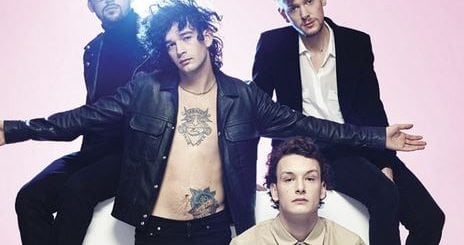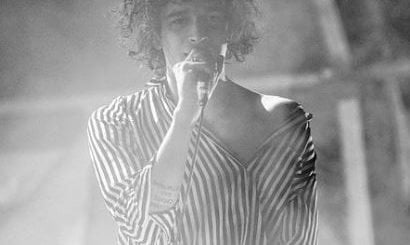Menswear by The 1975 Lyrics Meaning – Unraveling the Subtle Chaos of Social Facades
Lyrics
She’s dressed in white and putting off crying
“Well you’re the best man, so what’s the plan?
Why don’t you talk to Matty about it?”
I said, “I only brought three like I told you before
We’re gonna have to ask about”
Free bar, that’s the point
Spilling Amaretto ’cause of previous joints
I’m sitting with a girl, fortunate placing
Preceding railing racket off a porcelain basin
And who’s he? Giving you the lips?
I’ve never seen him knockin’ about
He looks just like me, but six foot three
So I reckon you could knock him out
“Well, I think I’ll say a couple of words if you don’t mind
I never really got on with your bird the first time
I met her out, dressed in nowt
Tellin’ everybody you were shagging about”
Well, who’s this? Going for the kiss
I’m probably gonna yosh in your mouth
Because it’s five past three, I can hardly see
And I’m on the verge of passing out
In the pantheon of The 1975’s eclectic discography, ‘Menswear’ crafts an enigmatic yet vivid narrative steeped in the revelry and repose of a seemingly mundane event: a wedding. This deceptively simple track branches into a myriad of intricate lanes, taking listeners on a tumultuous journey through the veneers and vices of social gatherings.
Imbued with Matty Healy’s storytelling prowess, the song flirts with themes of excess, superficiality, and introspection. The beauty of ‘Menswear’ lies not just in its lyrical content, but in its structural composition – a slow, building intro that crescendos into a powerful release. Here, we dissect crystalline layers of meaning to reveal the poignant commentaries hidden beneath the track’s stylish exterior.
The Resplendent Facade of Frivolity
Hong balls of LED energy pulsate through ‘Menswear’ as The 1975 invites us into the spectacle of a wedding reception – a social event often emblematic of joy and union. Yet, through Healy’s lens, we witness the flip side: indulgence without inhibition, interactions devoid of depth. It’s the free bar, the careless spilling of Amaretto, all symbols of the temptation to drown one’s identity in intoxication and the hedonistic pursuit to escape the grip of sobriety.
These scenes set the tone for an intimate exposé on human behavior, with Healy as our reluctant protagonist, navigating the terrain of forced conviviality. His mention of ‘three’ could allude to a literal or metaphorical triad – perhaps drinks, lines of cocaine, or simply facets of his public facade, each playing a role in the intricate dance of social expectations.
‘Well, I think I’ll say a couple of words if you don’t mind’ – A Warped Toast
‘Menswear’ sees its narrator poised to deliver a best man’s speech, yet the approaching spotlight brings a candid and almost resentful confession. Healy’s protagonist doesn’t hold back when addressing his true feelings about ‘your bird,’ eschewing the sweetened niceties expected of such an occasion for a bitter reality. This sharp deviation from tradition reflects a disruption in the narrative – a sudden dose of authenticity piercing through the illusory joy of the setting.
Away from judgmental ears, the best man spills secrets with the same careless abandon as the toppled drinks of the evening. The rawness suggested by ‘dressed in nowt’ reflects a double entendre – a woman’s scant clothing or, perhaps more compellingly, an emotional nakedness that reveals everyone’s underlying motives and desires.
An Ode to the Understated Influence of Indies
The instrumentation in ‘Menswear’ may not hit you with the force of some other harder-hitting tracks, but its subtle complexity is a hat-tip to The 1975’s indie roots. It’s the soundtrack of nostalgia, a mixtape for memories tinged with the bitter and the sweet. As the synth waves crash upon the shores of the listener’s consciousness, they evoke the aura of a dimly lit venue where the band first found their voice amongst asymmetrical haircuts and tightly rolled jean cuffs.
The subdued tones are no accident; they evoke the ephemerality of the scene – a transient night that, by morning, will feel as dreamlike and distant as the muffled beats that underscore the track. This musical approach mirrors the temporary romance of wedding bells, a single day of heightened reality before the return to ordinariness.
The Complexity of a Six Foot Three Lookalike
Interwoven in the storytelling is a stranger who is the spitting image of the narrator but stands taller by a literal and figurative margin. This doppelgänger is a clever device, a measurement of the societal pressures to ‘measure up’ and fall into the roles we are ascribed during such ceremonial functions. The ‘six foot three’ antagonist is not just a physical presence but the embodiment of expectations looming large over our protagonist’s own insecurities and sense of self.
It is this mirror image of a man that casts a shadow over the evening, inspiring the best man to contemplate the masquerade of social engagement and his place within it. Even so, the desire to contend with the specter – to ‘knock him out’ – underscores a yearning for individuality amidst the pressure to conform.
Deciphering the Hidden Meanings Beneath the Inebriated Blur
Peering through ‘Menswear’s’ intoxicating haze, the lyrics unveil a labyrinth of subtext. ‘It’s five past three, I can hardly see, and I’m on the verge of passing out’ speaks volumes of the point at which substance blurs essence. It’s a line that captures the precipice of self-annihilation, a willful descent into the numbness that follows as the night’s facades crumble away.
Yet, there’s a dual irony at play. As the spirits flow, so too does an undercurrent of verity: the explicit conversations, the unchecked desire, the raw appetites unmasked in the twilight of the party. In this chemically induced openness, Healy seemingly nods at the strange truth that sometimes, it is in our most inebriated states that we become our most real, most vulnerable, and most brazen selves.








